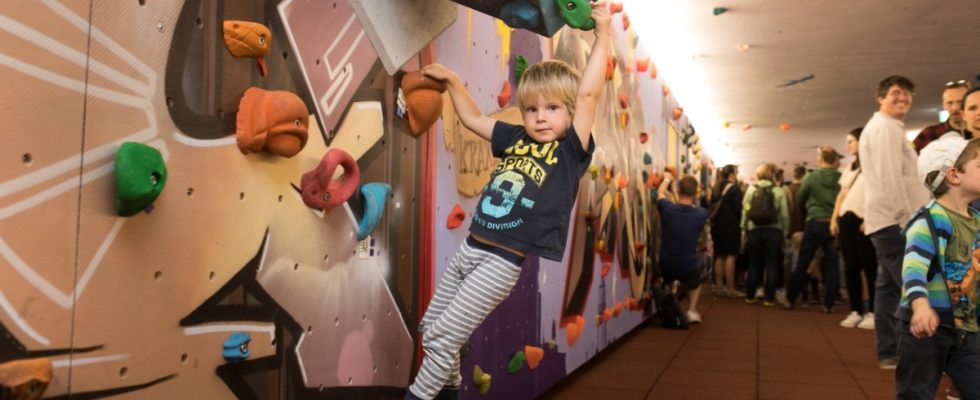Anyone who wants to have fun with Rosi in Munich needs something different from what she once had Spider Murphy Gang sung – no telephone. Instead, on Rosenheimer Strasse in Ramersdorf, he descends 21 steps into an underpass that until recently looked like many underpasses in the big city. Means: dark, dirty, depressing. But now it’s bright and friendly down here, there’s colorful graffiti on the walls, and young people and children are milling around. And all because of Rosi.
This refers to the “Giant Rosi”, a bouldering wall covering 700 square meters, which, according to the Kraxlkollektiv, is one of the largest of its kind in the world. The collective has already created several freely accessible climbing facilities in Munich – such as the recently dismantled “Lolliblock” in the “Sugar Mountain” cultural center or the “Dicken Hans”, which moved from Theresienwiese under the Candid Bridge in May 2022. Rosi is by far the largest project to date, for which the volunteers of the Kraxlkollektiv, which has been part of the Oberland section of the German Alpine Club (DAV) for two years, have drilled more than 16,000 holes, laid 14 tons of tartan flooring and screwed on hundreds of handles in four months .
“This is a bouldering wall that can compete in size with commercial bouldering halls. But it is free and accessible around the clock,” said Hannes Kuhl from Kraxlkollektiv on Tuesday afternoon at the official opening. Behind him, a few children are attempting a route that is marked with two yellow flags – the easiest category. But there are also numerous tricky routes for advanced climbers, some of them overhead and on sloping walls, says Kuhl. “I think this is a project that has great appeal and can advance bouldering in Munich.”
In any case, the “Giant Rosi” is in great demand, after all, climbing has been experiencing a boom for years, as evidenced by numerous new halls. “Climbing has enormous potential,” says Matthias Ballweg, chairman of the DAV Oberland section. “But it’s not low-threshold when it comes to the social component.” After all, the large bouldering halls cost up to 15 euros to enter, “which not everyone can afford,” says Kuhl. This is where the Kraxlkollektiv, founded in 2020 by Maximilian Gemsjäger, comes into play. Its members have made it their mission to make bouldering accessible to as many people as possible – through public, free climbing walls.
Of course, these have their price, which in the case of the “Giant Rosi” was more than 200,000 euros – plus a huge amount of personal effort, emphasizes Kuhl. The bouldering wall was financed by foundations, the city, the DAV and donations. The result is a climbing paradise 75 meters long, in a place that was once “a bare, dreary underpass,” says Kuhl. “And now it has become a beautiful Rosi.”

